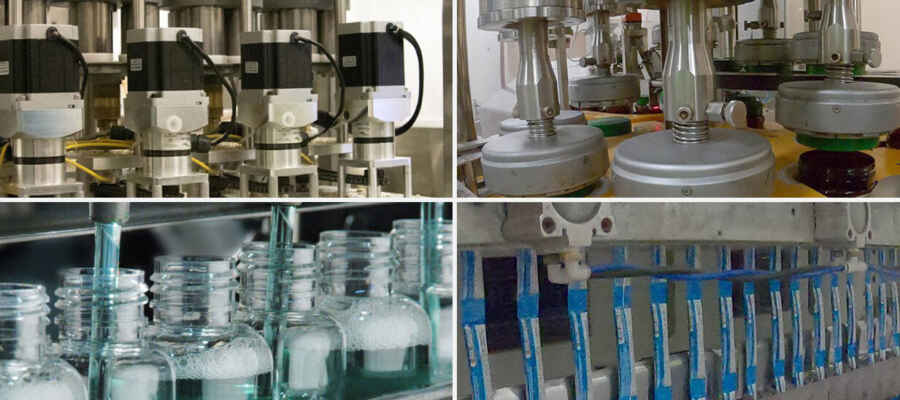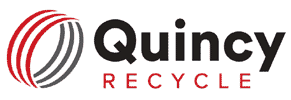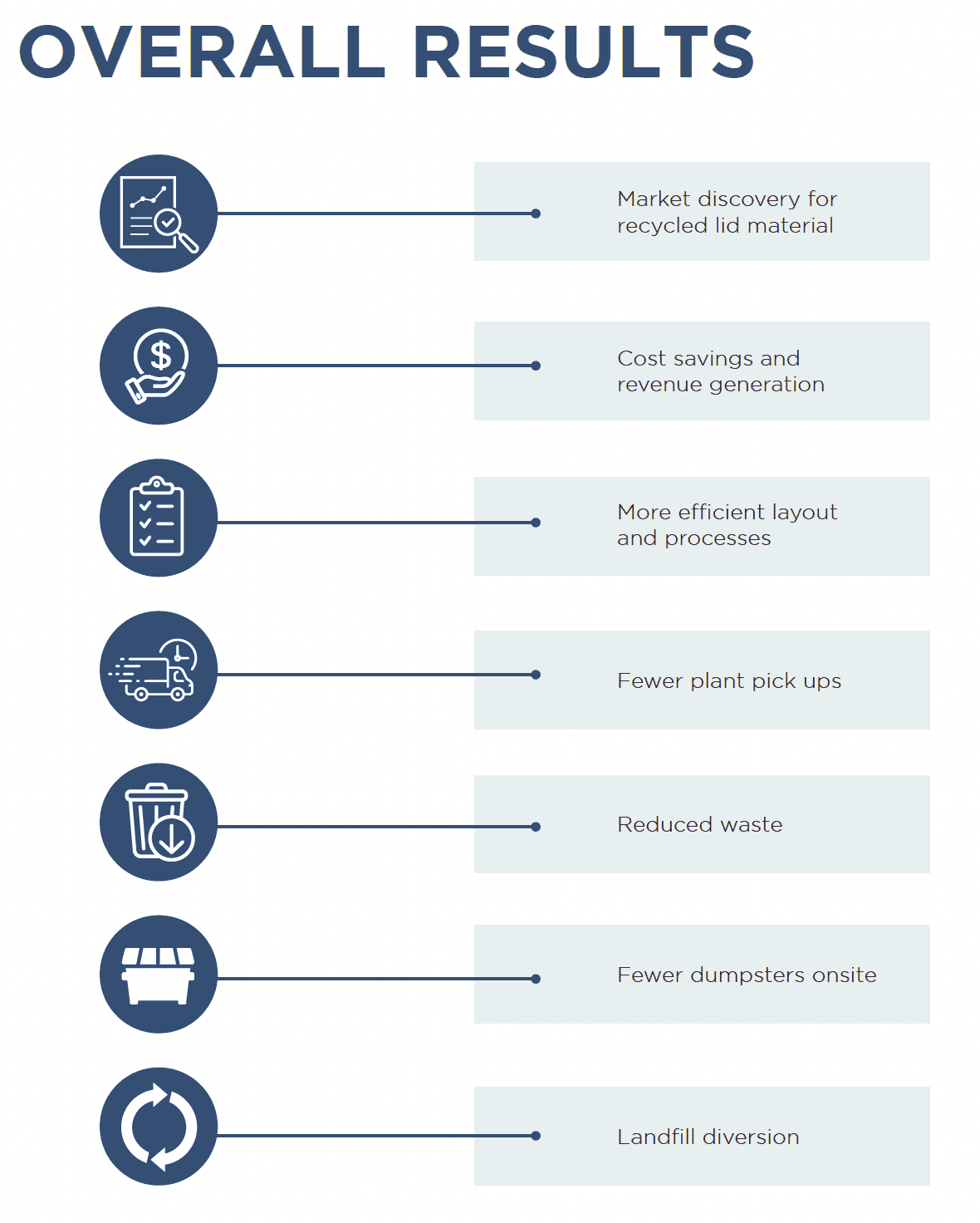When Recycling is a Top Priority: A True Tale of Success

Innovation and strategic thinking have always been integral to the MSI Express problem-solving approach, and there is no better place to apply both than in the realm of sustainability. This is the story of how, through persistence and the right partnership, MSI Express blew the lid off a long-time trash generation challenge.
THE PRIORITY
MSI Express is one of only a few packaging companies to employ the Hassia machine, which is a large form, fill, and seal machine. Driven by a need to maximize sustainability throughout the packing process, MSI Express searched for a way to recycle the mixed material of polystyrene and foil leftover from lids created on the Hassia. The lids are sealed on products such as plastic juice cups, which are formed on the machine from flat stock.
The high-impact polystyrene from the cups is easier to recycle than the lidding material that includes both lacquer and foil. The remaining mixed material around the lid punch-outs or “skeletons” were difficult to separate and created a recycling challenge. MSI Express worked for several years to find a vendor who could effectively recycle the lid material.
Most vendors recommended that MSI Express separate the materials, which was not time or cost efficient. An unwinding device was developed in house to mechanically separate the materials. However, the materials kept tearing, resulting in machine stops, scrapping more cups, and lost product. Frustrated but determined, MSI Express continued looking for a partner to recycle the “body stock” combination of materials without having to take the material apart and separate it. These materials made up a huge portion of waste stream from the plant. The goal was to avoid sending these materials to the landfill in alignment with MSI’s sustainability commitment.

Fortunately, an existing relationship with Quincy Recycle would prove to be the turning point. MSI Express had been partnering with Quincy Recycling to recycle the cardboard and drum waste at the Rosendale, WI plant. In 2022 Bretton Knuuttila, plant manager at MSI’s Rosendale and Ripon locations, made recycling the mixed material from the Hassia lids a top priority. Because of the strong trust MSI had with the Quincy Recycle team, Brett asked them to find a way to recycle the material.
THE SOLUTION
Finding a new market for the mixed materials.
The Quincy Recycle team, led by Brian Sixsmith, worked closely with the MSI Express Rosendale management team to understand their challenges and identify opportunities. After a year of research, networking, and drive to find an innovative solution, Quincy Recycle and MSI Express not only created an efficient recycling process at the Rosendale plant, but they also uncovered a market for the recycled punch-out skeletons without the need to separate the mixed materials.
It was a double win. MSI Express enjoyed both cost savings from landfill diversion as well as revenue generation from selling the recycled materials through Quincy Recycle.
“I was happy that Quincy Recycle accepted the body stock challenge,” Brett says. “I’ve been at the plant for 10 years working with the Hassia and scrap and all that goes with it. We end up hauling a lot of garbage out of here. Being able to recycle the body stock cut outs was an instant win for the plant. Many before me had worked on this project with other vendors. When Quincy Recycle found a solution, we were so excited.”
SUSTAINABLE BENEFITS
A Cost-Saving Partnership
Before 2022, MSI Express had been using separate companies for barrel hauling, and for recycling cardboard, garbage, and metals. Once Quincy Recycle created a solution to the mixed material lid recycling, MSI Express was able to streamline all recycling through the company. With the new changes MSI Express eliminated one full garbage pick up a week. In addition, the plant only requires one open-top dumpster onsite now instead of two.
The efficiencies have paid off in time and costs—and have created new revenue streams for MSI Express after Quincy Recycle found a market to sell the recycled materials.
“By centralizing recycling with Quincy Recycle, the Rosendale waste streaming is more efficient and has saved the plant money every month—that’s a huge win,” Brett says. “After all the unsuccessful recycling trials over the years, I was starting to doubt we could recycle the mixed material. The day I found out we could recycle it was huge—plus we could sell the product and make money. We were all celebrating in the plant.”

From Trash to Treasure
Buoyed by the success of recycling the mixed materials, MSI Express launched a Trash to Treasure program to further focus on making sustainability integral to business.
“This recycling solution was a huge boost to team morale, knowing we’re getting waste out of landfills,” Brett says. “It was the highlight of last year to make that happen and has opened the door to other possibilities. Our commitment goes beyond this plant. All our plants are working toward expanded recycling for a better future.”
The Trash to Treasure program makes recycling and waste reduction part of MSI’s production process now and has increased recycling by 37% from 2021-2023. From 2022 and 2023, MSI increased the tonnage of recycled materials, and divert 59% of their production waste from the landfill.
In February 2023, MSI acquired the Ripon, WI facility, which already had a strong recycling program in place. Today, the Rosendale and Ripon plants are sharing resources as the teams determine the potential of other materials to recycle. This project was possible because of the commitment and partnership of Quincy Recycle and MSI Express.
“The Rosendale plant got the ball rolling on the whole initiative and sparked new ideas for recycling opportunities,” Brett says. “The success of recycling the mixed materials lids has been a game changer. There has been an overall culture shift in the plant with more focus on recycle and reuse initiatives rather than throwing things away. It’s creating a new mindset. It’s sparking questions and ideas from people on the floor and the management team about ways to recycle other materials. They are engaged in finding solutions. Rather than sending these materials to the landfill and burying them, we are making use of them. We’re reducing our environmental footprint while benefiting from cost savings and revenue generation.”